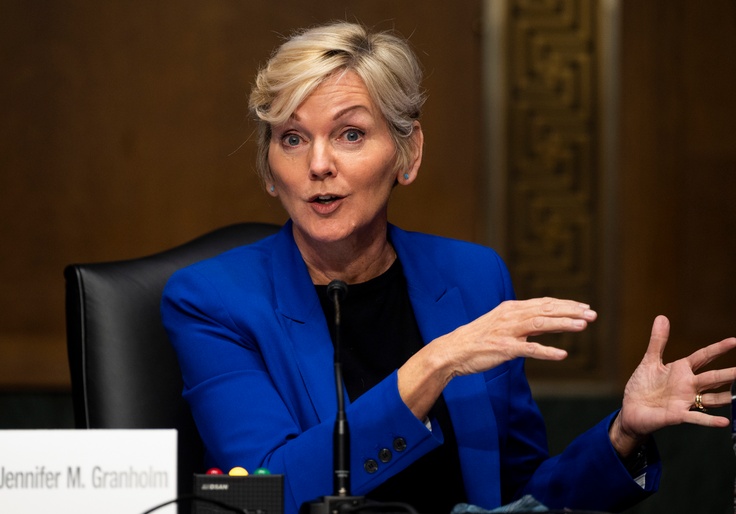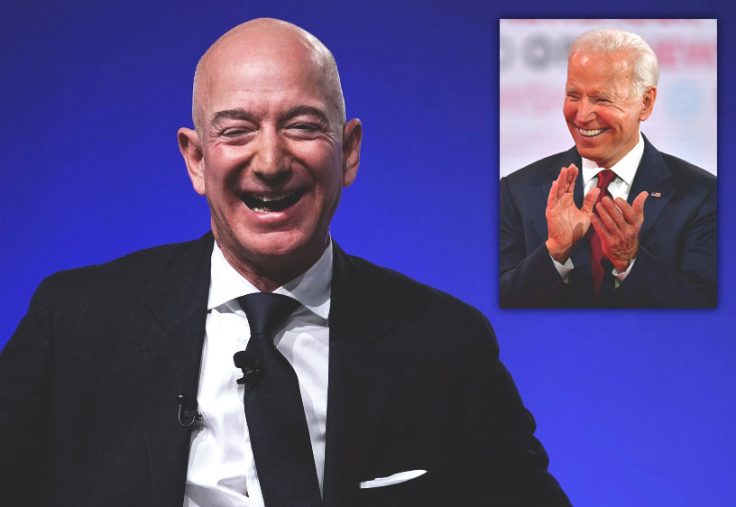‘Worse than Solyndra’: Republicans Press for Information on Biden Admin’s Favorite Electric Battery Company
Energy Secretary Jennifer Granholm has up to $5 million invested in company Biden promoted

Republican senators are working to make the electric battery company President Joe Biden toured to promote his $1.9 trillion infrastructure plan this administration's Solyndra.
Biden's promotion of electric battery and bus manufacturer Proterra has struck a nerve on Capitol Hill after the Washington Free Beacon reported that Biden's energy secretary, Jennifer Granholm, still has up to $5 million invested in the company. The administration's $1.9 trillion infrastructure plan includes a $174 billion investment in electric vehicles, as well as plans to replace diesel-powered buses with electric-powered buses—the very product Proterra specializes in.
Sen. Ted Cruz (R., Texas) says the conflict of interest created by Biden's visit has the potential to be "even worse than Solyndra," the solar panel company that went bankrupt after receiving hundreds of millions of dollars in government-backed loans from the Obama administration.
"President Biden's decision to heavily promote a business where his energy secretary holds a multimillion-dollar stake has all the potential to be even worse than Solyndra," Cruz told the Free Beacon. "President Biden and Secretary Granholm should immediately remove themselves from their glaring conflict of interest."
The Solyndra boondoggle became a lasting symbol of failure during the Obama administration, which awarded the green energy firm a $535 million loan guarantee through the 2009 stimulus package. The loan was announced with fanfare by then-vice president Biden and Energy Secretary Steven Chu during a Sept. 4, 2009 speech at Solyndra's California headquarters. Obama, even after being warned that the company was on the brink of failure, visited its headquarters a few months later and hailed it for "leading the way toward a brighter and more prosperous future."
The company months later shut down all operations and declared bankruptcy.
The overt promotion of Solyndra bears resemblance to the current treatment of Proterra, which in the first hundred days of the Biden administration won a visit by the president as well as a visit by Vice President Kamala Harris to one of its largest partners. Biden predicted during his virtual visit that companies like Proterra were "going to end up owning the future." Biden also promised the company he would return for an in-person visit in the near future.
The White House says Granholm, who has been given a major role in both crafting and selling the infrastructure package, played no role in planning the visit to Proterra. Granholm resigned from the company's board but has yet to divest her up to $5 million in the company, which was acquired for $1.6 billion this January.
Sen. John Barrasso (R., Wyo.), the ranking member of the Senate Energy and Natural Resources Committee, has asked the Department of Energy's inspector general to investigate any conflicts of interest created by Granholm's stake in Proterra.
Barrasso pointed in the letter to assurances made by Granholm during her confirmation hearing that she would not only resign from Proterra but also recuse herself from any issue with an "effect on the financial interests of Proterra" until fully divested. Biden has since used an executive order to place Granholm in charge of "identifying risks in the supply chain for high-capacity batteries, including electric-vehicle batteries, and policy recommendations to address these risks."
"Secretary Granholm leads the Department of Energy, which plays a central role in the nation's development of electric vehicles, batteries, and charging infrastructure," Barrasso said.
Barrasso is asking for details on the status of Granholm's investment, as well as all information regarding the planning of both Biden's tour of Proterra and Harris's trip to Thomas Built Buses, the Proterra partner organization.
Granholm said she will sell the Proterra stock within the 180-day window she agreed to when she took the position.
"I've signed an ethics agreement that requires me to divest of all of my individually owned stocks, like all federal appointees, within 180 days, and I certainly will do that," Granholm told Politico on Monday.
Brian Deese, whom Biden appointed director of the National Economic Council, joined the president on his tour of Proterra and said the infrastructure plan would direct money to the company, pointing to both the $45 billion set aside to make the country's buses electric and $32 million to boost electric battery manufacturers.


No comments:
Post a Comment